[The following report was issued by the Pew Research Global Attitudes Project on 1 May 2013.]
Widespread Middle East Fears that Syrian Violence Will Spread
As concern mounts about the Syrian government’s possible use of chemical weapons against its own people, publics in the Middle East – especially the Lebanese – are extremely worried about violence spreading to neighboring countries. Nonetheless, a new survey by the Pew Research Center, conducted before news emerged of alleged use of chemical agents by the regime of Syrian President Bashar al-Assad, found little regional support for Western or Arab countries sending arms and military supplies to anti-government groups in Syria. And there is even greater opposition among American and European publics to such indirect Syrian involvement by their governments. A more recent Pew Research nationwide U.S. poll finds that hard evidence that Damascus has engaged in chemical warfare would only lead to a modest increase in American public support for an allied military effort in Syria.
Meanwhile, Assad is very unpopular throughout the region, except among Shia Muslims in Lebanon. In turn, Lebanese Muslims are divided over aid to the rebels. Most Sunnis back such assistance, while Shia overwhelmingly oppose it.
These are the key findings from a new survey by the Pew Research Center of 11,771 people in 12 countries from March 3 to April 7, 2013. Surveyed countries include Lebanon, Jordan, Turkey, Egypt, Israel, the Palestinian territories and Tunisia in the Middle East; Germany, France and Britain in Europe; and the United States and Russia.
Fear of Spreading Violence
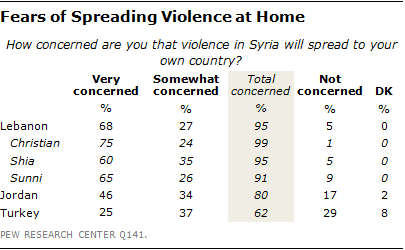
Publics in the region are deeply concerned that the fighting in Syria could one day spread to neighboring nations. This worry is particularly prevalent in predominantly Muslim countries that share a border with Syria, notably Lebanon and Jordan.
With clashes escalating along the Syrian-Lebanese frontier, more than nine-in-ten Lebanese (95%) worry that Syria’s violence may spill over into their nation, including 68% who are very concerned. Such fears are shared by all the principal religious groups in Lebanon: the Christians (99%), Shia (95%) and Sunni (91%). With roughly 400,000 Syrian refugees already seeking shelter in Jordan, 80% of Jordanians express concern about the Syrian fighting spreading into Jordan. In Turkey, which already harbors nearly 300,000 Syrians who have fled the civil war, 62% say they are apprehensive that the violence could infect their society.
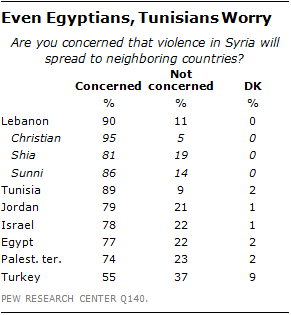
Middle Eastern nations slightly further afield are only marginally less concerned. In Tunisia, 89% worry that the turmoil in Syria could lead to new unrest in other countries. In Egypt, 77% of those surveyed express anxiety that the violence might trigger conflicts elsewhere; as do 74% in the Palestinian territories. Meanwhile, the Israelis, who have fought four major wars with the Syrians, look on with unease. Nearly eight-in-ten (78%) Israelis are concerned that the fighting north of the Golan Heights could eventually lead to instability in other parts of the region.
Few Favor Arming Rebels
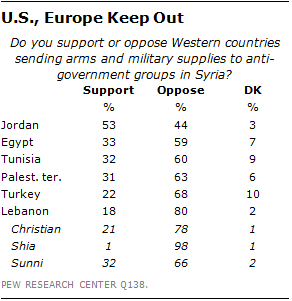
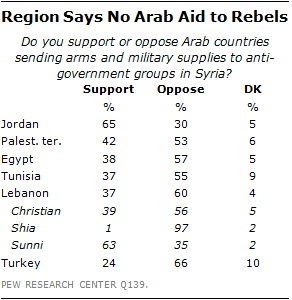
Despite such concerns, publics in the region are generally opposed to both Western and Arab governments sending arms and military supplies to anti-government groups in Syria.
Populations in five of the six countries in the region that were surveyed oppose Americans or Europeans supplying the Syrian rebels with weapons. This opposition is particularly strong in Lebanon where 80% of the total public and 98% of Shia Lebanese do not want the West to
get involved. In Jordan (53%) about half the population supports American or European military assistance for the Syrian opposition.
Similarly, only the Jordanians (65%) and Lebanese Sunnis (63%) back Arabs arming the rebels. Nearly all the Shia (97%) surveyed in Lebanon are opposed to such outside intervention.
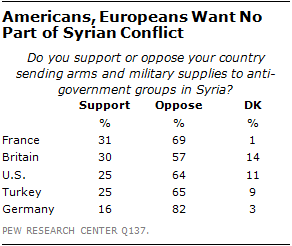
At the same time, there is no public support in the United States, Western Europe or in Turkey for sending arms and military supplies to the anti-government groups in Syria. Eight-in-ten (82%) Germans oppose such assistance, as do more than two-thirds of the French (69%) and the Turks (65%) and a majority of the British (57%). Nearly two-thirds (64%) of Americans were also against arming the rebels when the survey was taken in the first two weeks of March. Since then evidence has emerged that the Assad government may have used chemical weapons in its fight against opposition forces. In a subsequent Pew Research Center poll taken April 25-28, Americans, by a 45% to 31% margin, favor rather than oppose the U.S. and its allies taking military action against Syria, if it is confirmed that Syria used chemical weapons against anti-government groups.
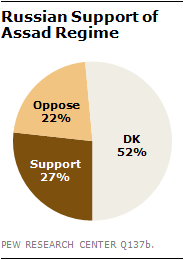
Meanwhile, the Russian government, long an ally of the Assad regime and a vocal opponent of outside intervention in the Syrian civil war, can claim little backing for its policy from its own people. Just 27% of Russians approve of Moscow’s support of the Syrian government. Most Russians (52%) have no opinion on the issue.
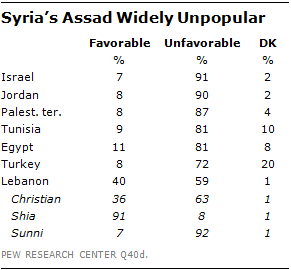
There is little public backing for Syrian president Bashar al-Assad from the mostly Sunni Arab publics in the Middle East. Only the Shia in Lebanon (91%) have a favorable view of him. (Assad comes from a family of Alawites, a branch of Shia Islam.)
Roughly nine-in-ten Lebanese Sunnis (92%), Israelis (91%) and Jordanians (90%) have a negative view of the Syrian leader, as do eight-in-ten Egyptians (81%) and Tunisians (81%) and seven-in-ten Turks (72%). Even the Christians in Lebanon (63%) oppose Assad, despite the relative protection the Assad family has given the Christian community in Syria over the years.
The intensification of the conflict in Syria in the last year has not altered regional views of Assad. He was not liked in 2012 and he is not liked today.
[Click here to view the full report and survey methods.]